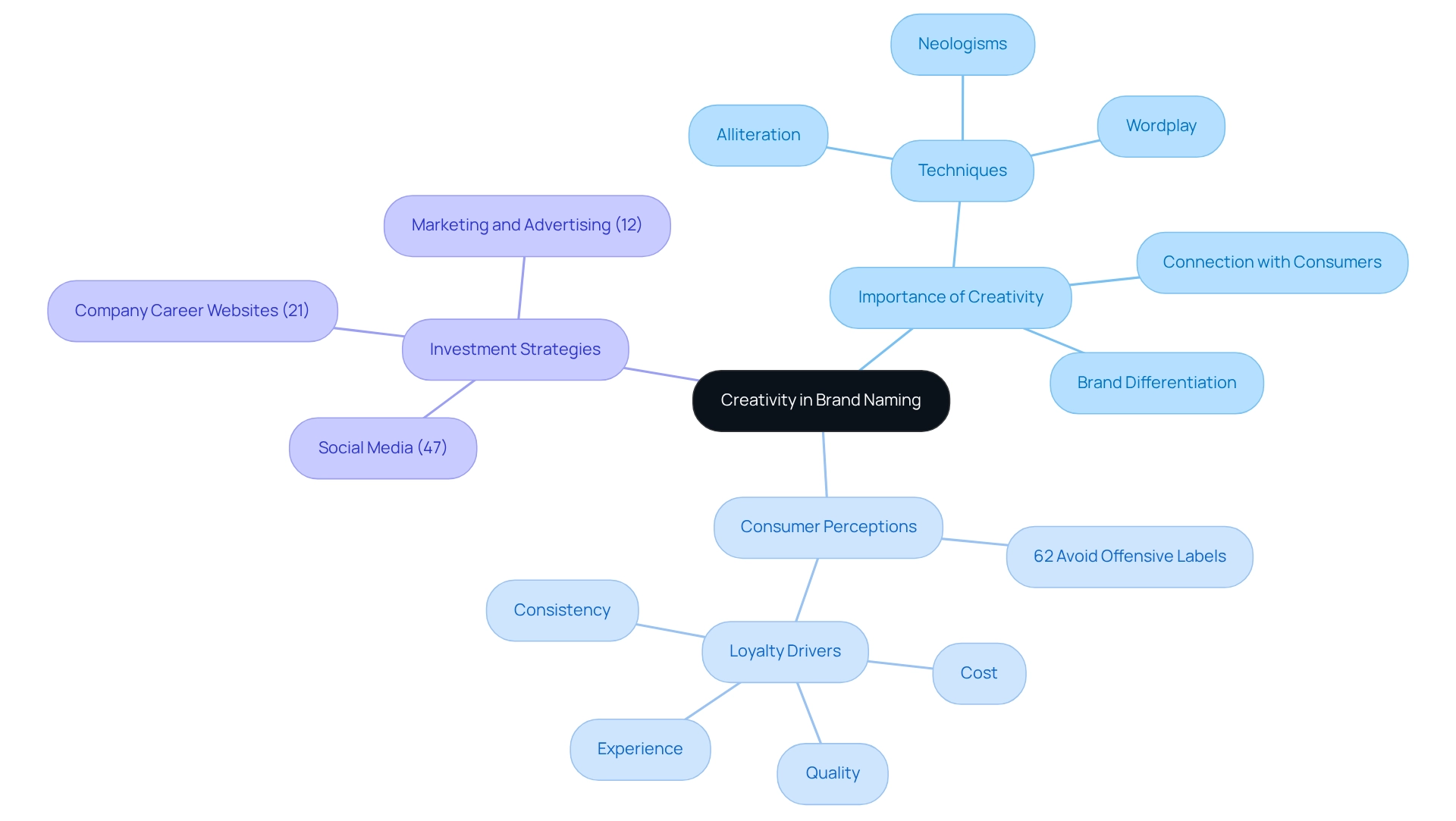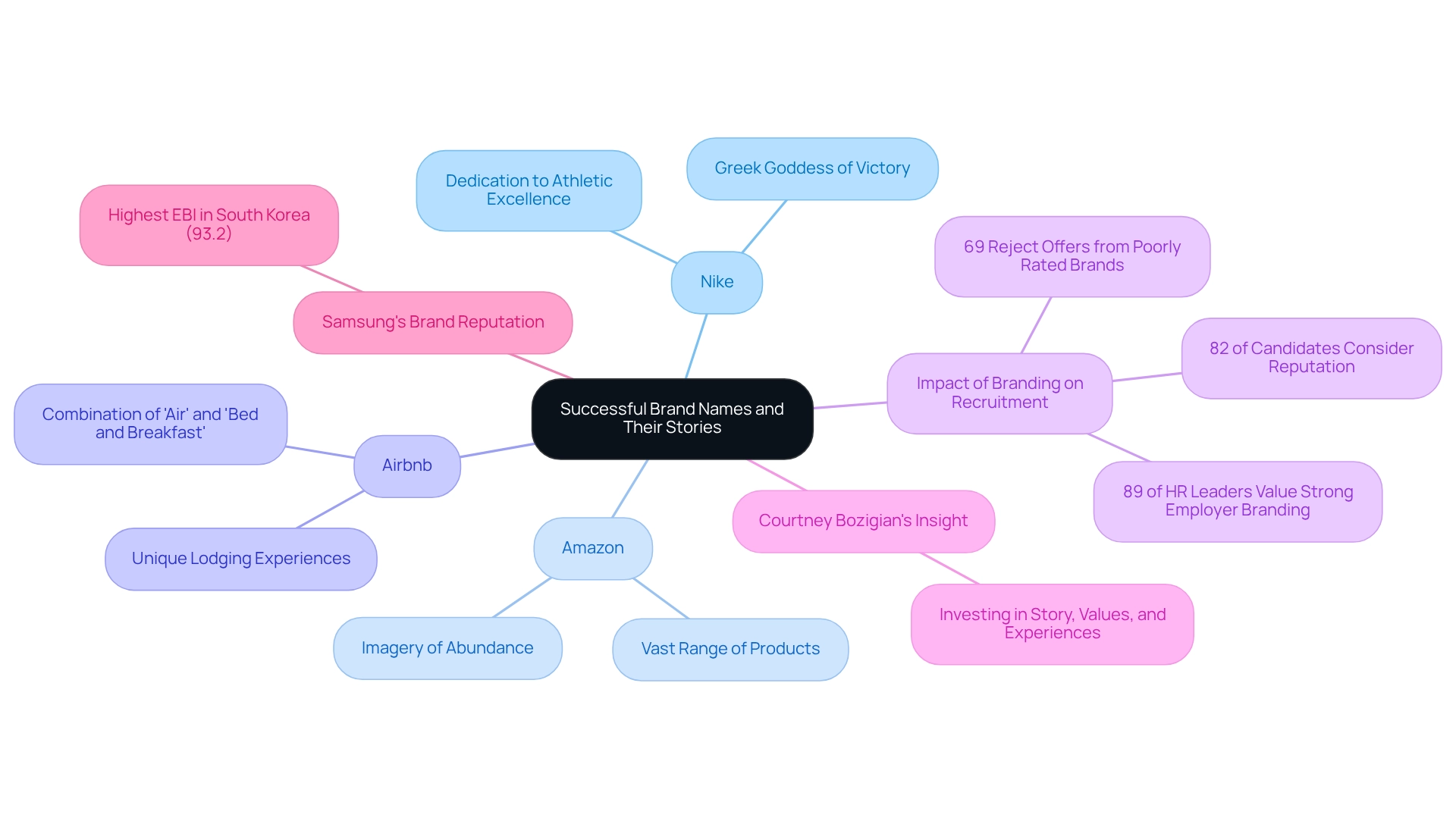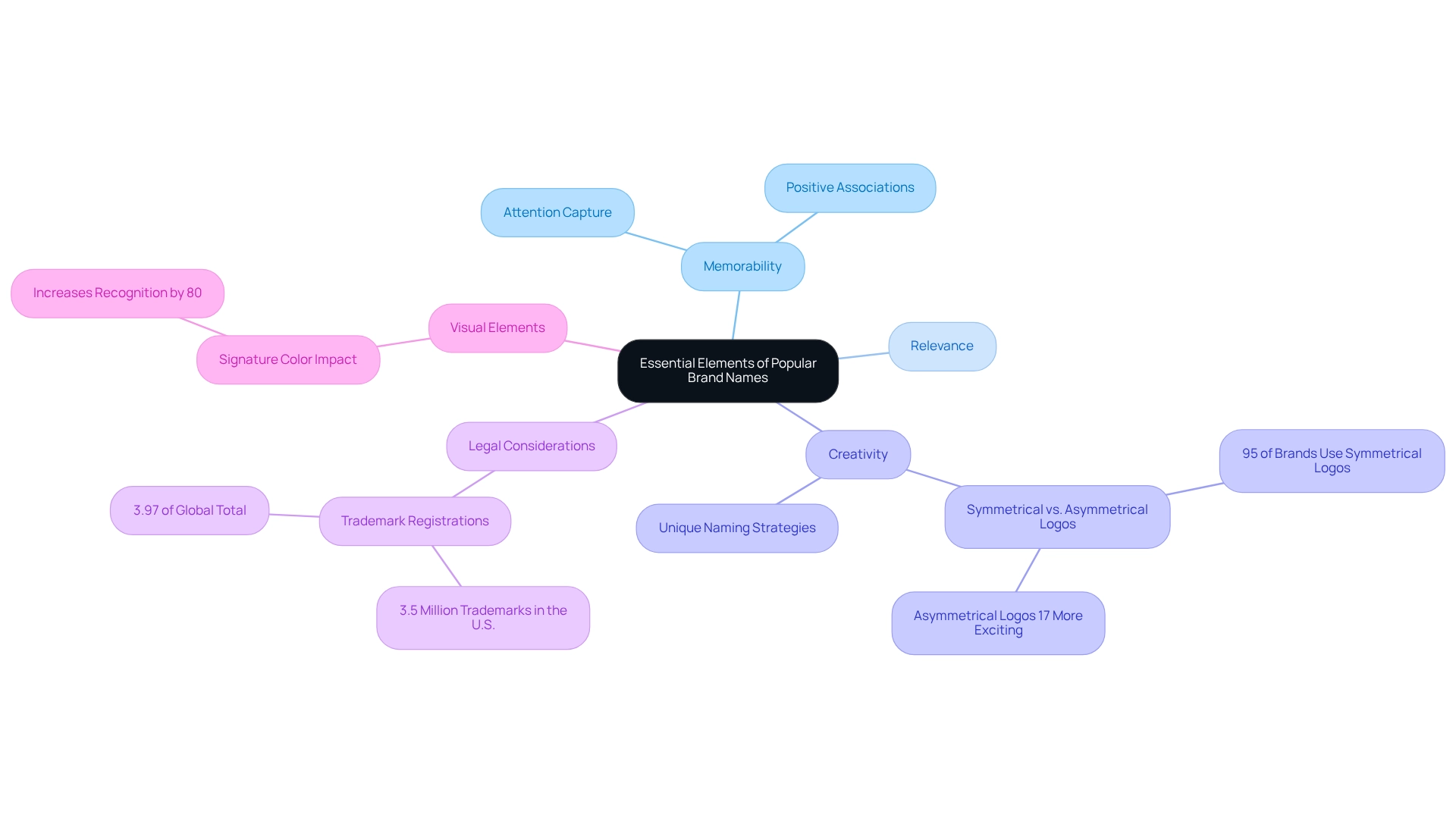Digital Branding Strategies
What Makes Brand Names Popular? Understanding the Key Factors
Overview
Brand names gain prominence through their memorability, relevance, and strategic alignment with a company’s identity, which cultivates robust consumer connections and loyalty. Successful brand names, such as Nike and Apple, resonate deeply with consumers by embodying essential values and principles. These brands ensure authenticity and creativity in their branding strategies, establishing a strong foothold in the market. By examining these case studies, we can draw actionable insights that reinforce the importance of strategic branding in fostering consumer loyalty.
Introduction
In the realm of marketing, brand names transcend mere identifiers; they encapsulate the very essence of a company’s identity and are pivotal to its success. A meticulously crafted brand name can evoke powerful emotions, foster meaningful connections, and distinguish a product in an increasingly crowded marketplace.
Take, for instance, iconic brands like ‘Nike’ and ‘Apple’; these names not only represent their products but also embody values that resonate deeply with consumers. As the landscape of consumer behavior continues to evolve, grasping the significance of brand names becomes imperative for businesses striving to thrive.
This article embarks on an exploration of the multifaceted role of brand names in marketing, examining their defining characteristics, strategic considerations, creative potential, and the technical challenges that companies encounter in the naming process. Through insightful case studies and expert opinions, this exploration reveals how a compelling brand name can drive consumer loyalty and ultimately shape a brand’s trajectory in a competitive environment.
The Importance of Brand Names in Marketing
Brand names transcend mere labels; they encapsulate a company’s identity and serve as a cornerstone of its marketing strategy. An engaging product title can elicit intense feelings, create significant connections, and differentiate an item in a crowded market. For instance, brands like ‘Apple’ and ‘Nike’ not only represent products but also embody fundamental principles such as innovation and athleticism, which resonate strongly with consumers.
The strength of brand names lies in their ability to express the company’s promise and engage with its intended audience. Research from The Design Council indicates that 73% of shoppers make buying choices based on visual attractiveness, underscoring the importance of a well-designed identity that aligns with customer expectations. Furthermore, as personalization becomes increasingly vital—27% of consumers currently deem it crucial for loyalty—companies must ensure their identifiers reflect their unique value propositions and resonate with individual consumer preferences.
In 2025, the influence of identifiers on consumer behavior continues to evolve, with expert opinions emphasizing that a strong identifier can significantly affect emotional responses and purchasing decisions. Effective product identity strategies often involve taking a stance on social issues, which can distinguish a company in the market. Moreover, exceptional customer support remains a crucial element in fostering enduring loyalty.
Statistics reveal that only 30% of businesses consistently apply their branding guidelines, while 15% lack them entirely, highlighting a missed opportunity for many firms to leverage their names effectively. This is where WonderEight excels, offering comprehensive branding and digital marketing solutions that encompass brand audits, strategy development, and innovative gamification techniques. For example, a recent case study illustrated how WonderEight assisted a client in enhancing customer engagement by 40% through tailored branding strategies.
Brands that prioritize their identity and marketing strategies frequently achieve greater consumer engagement and loyalty. Ultimately, the significance of brand names in marketing cannot be overstated, as they play a crucial role in shaping perceptions and driving business success.
Key Characteristics of Effective Brand Names
Successful product titles often incorporate brand names that are well-regarded for their essential traits, which contribute to their market success. Notably, popular brand names are memorable, easy to pronounce, and relevant to the products or services they represent. A title that resonates with buyers lingers in their memories, fostering product recognition.
For instance, ‘Google’ stands out as a brand name recognized for its easy pronunciation and association with online searching, exemplifying the power of a thoughtfully chosen title. Moreover, an effective label should evoke positive associations and embody the essence of the brand, making it relatable to the target audience. Brand names like ‘Coca-Cola’ successfully communicate a sense of refreshment and enjoyment, enhancing their overall appeal.
Statistics reveal that 88% of customers prioritize authenticity in marketing efforts, highlighting the significance of a title that aligns with genuine values and resonates with clients on a deeper level.
The influence of memorable titles extends beyond mere public recognition; they are also pivotal in fostering loyalty. Key factors that drive this loyalty include cost, experience, quality, and consistency. Companies that maintain a consistent marketing strategy are 3.5 times more likely to achieve strong visibility compared to those that do not.
This consistency fortifies the company’s identity and cultivates trust among customers, further solidifying the connection between trademarks and loyalty.
As we look toward 2025, the attributes of effective trademarks continue to evolve, yet the fundamental principles remain steadfast. Experts assert that a signature color can enhance recognition by 80%, underscoring the importance of visual identity in conjunction with a memorable title. Additionally, case studies indicate that organizations with strong reputations attract talent more effectively; 69% of job candidates reject offers from companies with weak branding.
This illustrates how popular brand names not only shape consumer perceptions but also play a crucial role in organizational success by enhancing overall reputation.
Strategic Considerations in Brand Naming
Strategic considerations are paramount in crafting a compelling product identity. Businesses, such as WonderEight, must meticulously assess their target market, competitive landscape, and overall positioning. An effective trademark should resonate with customers while distinctly differentiating the brand from its competitors.
Take, for instance, ‘Tesla,’ which has adeptly positioned itself as a pioneer in innovation and sustainability, appealing to environmentally conscious consumers.
Moreover, companies must consider future growth potential; a label that is overly specific may hinder expansion into new markets or product lines. Research indicates that:
- 75% of consumers are more likely to remain loyal to brands that they recognize individually, underscoring the importance of aligning these brand identities with the values and expectations of the audience.
- 59% of consumers would wait for products to be restocked at their preferred retailer’s store or website, highlighting the critical role of loyalty in consumer behavior.
Selecting a strategic title necessitates a delicate balance between creativity and market relevance, ensuring that the name not only captures attention but also aligns with the company’s long-term vision. As Macy, a content marketing consultant, articulates, “the way you create and promote your identity strongly impacts the results you drive.” Increasingly, marketers prioritize loyalty—50% identify it as a primary objective in their content strategies—therefore, companies like WonderEight must adopt a forward-thinking approach to identity creation that anticipates shifts in consumer preferences and market dynamics, particularly concerning brand names favored by consumers.
Case studies, such as the comprehensive campaign for Quaker Oats, illustrate how effective product identification and positioning can forge stronger customer connections and enhance market share. WonderEight’s innovative design and technology integration in this campaign exemplify how companies can cultivate identities that not only stand out but also foster lasting loyalty among customers.
The Role of Creativity in Brand Naming
Creativity stands as a pivotal element in brand naming, transforming a mere label into a compelling brand identity that resonates with market trends. Distinctive and creative titles not only capture interest but also ignite curiosity among consumers. For example, ‘Spotify’ ingeniously combines ‘spot’ and ‘identify,’ suggesting a service dedicated to helping users discover music tailored to their preferences.
Such imaginative titles often leverage techniques such as wordplay, alliteration, or neologisms, significantly enhancing their memorability. Furthermore, a thoughtfully crafted label can evoke emotions and weave a narrative that profoundly connects with consumers, fostering a deeper relationship. Brands renowned for prioritizing creativity in their branding strategies are better positioned to distinguish themselves in a saturated marketplace.
A recent survey reveals that 62% of shoppers would steer clear of a label that offends them politically, highlighting the necessity of aligning brand identity with consumer values.
The influence of unique product names on market success is further evidenced by a Facebook survey of 15,000 individuals, which identified cost, quality, experience, and consistency as the foremost qualities driving loyalty. Brands that adeptly fulfill these criteria are more likely to sustain customer loyalty, demonstrating that innovation in naming can forge enduring consumer connections. This is particularly relevant given the recent trend where trademark applications at the U.S. office saw a decline of 10.1% between 2022 and 2023, indicating a shift in how companies approach naming in a competitive landscape.
As we look toward 2025, the role of creativity in naming continues to evolve, with statistics indicating that the top three investments for enhancing employer identities are:
- Social media (47%)
- Company career websites (21%)
- Marketing and advertising (12%)
This suggests that companies, including WonderEight, should focus their resources on innovative strategies that not only enhance identity but also resonate with their target audience. Ultimately, effective and innovative labels, recognized as popular brand names, not only stand out but also play a crucial role in shaping consumer perceptions and driving business success.
To cultivate these connections, companies must clarify their values and uphold authenticity, ensuring that their identities reflect core principles and resonate with consumers.

Technical Hurdles and Legal Considerations in Brand Naming
Establishing a brand identity necessitates navigating a complex landscape of technical and legal challenges. A primary consideration is trademark availability; a title that closely resembles an existing trademark can lead to costly legal disputes. To mitigate such risks, businesses must conduct comprehensive searches to ensure their chosen title is both unique and protectable.
Statistics reveal that 13% of companies fail to enforce their guidelines, resulting in confusion and dilution of their identity, which underscores the importance of proactive protection.
Furthermore, companies must assess the adaptability of their title across diverse markets and cultures. A name that resonates positively in one region may carry negative connotations elsewhere, potentially damaging the company’s reputation. The partnership between WonderEight and Quaker Oats exemplifies the significance of aligning marketing strategy with market positioning.
This collaboration not only enhanced the alignment of identities but also heightened consumer loyalty, demonstrating the effectiveness of a tailored identity strategy.
Legal considerations extend beyond mere availability; the Trademark Dilution doctrine protects well-known trademarks from dilution or tarnishment, emphasizing the necessity for caution in title strategies. This doctrine is particularly critical as it highlights the potential risks associated with product labeling, where neglecting existing trademarks can lead to severe repercussions. As the landscape evolves in 2025, understanding these legal frameworks becomes increasingly vital for product managers.
Moreover, technical challenges may arise during the title selection process, such as ensuring that the title is not only unique but also resonates with intended audiences. Expert opinions indicate that thorough market research and legal evaluations are essential measures to mitigate risks related to product identification. Additionally, the USPTO’s Trademark Trial and Appeal Board Reading Room provides access to significant trademark rulings, serving as a valuable resource for managers navigating these complexities.
By addressing these factors, companies can effectively launch and sustain a name that stands out in a competitive marketplace. WonderEight delivers innovative branding and digital marketing solutions that empower businesses to navigate these challenges adeptly. As highlighted by Business Insider, the investment companies make in logo design can range from completely free to millions, illustrating the financial implications of identity creation and design.
By investing judiciously in these areas, companies can enhance their identity and market presence, leveraging WonderEight’s expertise to achieve global business success.
Case Studies: Successful Brand Names and Their Stories
A study of successful product names underscores the critical role of strategic naming in shaping buyer perceptions. For example, ‘Nike,’ named after the Greek goddess of victory, aligns seamlessly with the company’s dedication to athletic excellence and performance. Likewise, ‘Amazon’ was chosen to reflect the extensive range of products available, conjuring imagery of the world’s largest river—an emblem of abundance and diversity.
This thoughtful selection not only resonates with shoppers but also encapsulates the company’s mission to provide a comprehensive shopping experience.
Another compelling case is ‘Airbnb,’ which cleverly combines ‘air’ with ‘bed and breakfast,’ clearly indicating its service of offering unique lodging experiences. This strategic naming approach enhances product identity and fosters consumer engagement by effectively communicating the essence of the service.
At WonderEight, we assert that successful identities transcend mere labels; they are strategic assets that embody company values and resonate with target audiences, ultimately driving engagement and loyalty. Our branding and digital marketing solutions are meticulously designed to aid businesses in crafting influential labels akin to those discussed. We collaborate closely with our clients to develop distinctive branding strategies that elevate their market presence and identity.
Statistics reveal the paramount importance of company reputation in the job market; in 2023, 82% of potential candidates considered a company’s reputation before applying for a position. This highlights how product names and their associated narratives can significantly influence perceptions, not only among buyers but also in attracting talent. Furthermore, 69% of job applicants are likely to reject offers from companies with negative reputations, underscoring the vital role of branding in recruitment.
As Courtney Bozigian aptly states, “Today, buyers are not just acquiring products or services — they are investing in the narrative, values, and experiences that come with them.”
These examples illustrate that effective product titles, including brand names favored by consumers—such as those we assist in developing at WonderEight—are essential for companies striving to thrive in a competitive landscape. Companies like Samsung, which boasts the highest EBI in South Korea at 93.2, exemplify how a robust reputation can significantly sway public perception and preference. At WonderEight, we are dedicated to empowering our clients to achieve similar success through innovative branding strategies.

The Essential Elements of Popular Brand Names
The success of popular brand names is defined by several crucial components: memorability, relevance, and strategic alignment with the label’s identity. A title that resonates with buyers not only captures attention but also evokes positive associations, making it easier for clients to recall and connect with the brand. In fact, statistics indicate that 88% of clients prioritize authenticity in branding efforts, underscoring that names reflecting genuine values are essential for influencing perceptions and fostering trust.
At WonderEight, we assert that creativity is vital in crafting these names, as it distinguishes an entity in a crowded marketplace. Our innovative marketing strategies have proven effective; research suggests that approximately 95% of companies utilize symmetrical logos, yet consumers find asymmetrical logos 17% more thrilling. This insight indicates that uniqueness can significantly boost product appeal.
Moreover, a signature color can enhance recognition by 80%, highlighting the importance of visual elements alongside the brand name itself.
Legal considerations are equally crucial; companies must diligently manage trademark registrations to protect their identity. In the U.S. alone, companies registered 3.5 million trademarks, representing 3.97% of the global total. This statistic emphasizes the competitive landscape of product naming and the challenges companies face in developing memorable and relevant brand names that resonate with consumers.
Successful case studies from WonderEight provide valuable insights into the impact of a well-crafted title. For instance, companies investing in our effective marketing strategies have avoided the substantial costs associated with inadequate branding, which can lead to diminished customer trust and unfavorable reputations. Specific outcomes from these case studies illustrate that companies failing to establish a strong identity may incur significant expenses to recover from branding failures.
By analyzing these examples, businesses can grasp the power of a strong brand name as a vital asset that profoundly influences consumer perceptions and drives business success.

Conclusion
Crafting a powerful brand name is a fundamental strategy for companies striving to excel in a competitive marketplace. Effective branding reveals that names do not merely serve as identifiers; they embody a company’s values and promises. Consider memorable and relatable names like ‘Nike’ and ‘Coca-Cola’ alongside creatively constructed ones such as ‘Spotify’ and ‘Airbnb.’ The alignment of brand names with core values and consumer expectations is paramount.
Strategic considerations in brand naming necessitate a deep understanding of market dynamics and consumer preferences, enabling brands to adapt and grow over time. Legal and technical challenges present significant hurdles, underscoring the necessity for thorough research and protection of brand identity. Successful case studies illustrate how thoughtful naming can enhance consumer engagement and loyalty, demonstrating that a well-crafted name is a powerful asset in shaping perceptions and driving business success.
Ultimately, the significance of brand names in marketing lies in their capacity to evoke emotions, build trust, and foster lasting connections with consumers. As the landscape continues to evolve, businesses must prioritize the development of compelling brand identities that resonate with their target audiences, ensuring relevance and impact in an ever-changing market. A strong brand name transcends mere labeling; it serves as a strategic tool that can propel a company toward sustained success.
Frequently Asked Questions
What role do brand names play in a company’s identity and marketing strategy?
Brand names encapsulate a company’s identity and are a cornerstone of its marketing strategy. They can elicit feelings, create connections, and differentiate products in a crowded market.
How do strong brand names affect consumer behavior?
Strong brand names express the company’s promise and engage the intended audience. They can significantly affect emotional responses and purchasing decisions, with 73% of shoppers making choices based on visual attractiveness.
What is the importance of personalization in branding?
Personalization is increasingly vital for consumer loyalty, with 27% of consumers considering it crucial. Companies must ensure their identifiers reflect unique value propositions and resonate with individual consumer preferences.
What statistics highlight the application of branding guidelines among businesses?
Only 30% of businesses consistently apply their branding guidelines, while 15% lack them entirely, indicating missed opportunities to leverage their brand names effectively.
How does WonderEight assist companies with branding?
WonderEight offers comprehensive branding and digital marketing solutions, including brand audits, strategy development, and gamification techniques, helping clients enhance customer engagement through tailored branding strategies.
What characteristics make a successful product title?
Successful product titles are memorable, easy to pronounce, and relevant to the products or services they represent. They should evoke positive associations and embody the brand’s essence.
How does authenticity influence customer priorities in marketing?
88% of customers prioritize authenticity in marketing efforts, emphasizing the need for titles that align with genuine values and resonate deeply with clients.
What factors drive customer loyalty related to brand names?
Key factors driving loyalty include cost, experience, quality, and consistency. Companies with consistent marketing strategies are 3.5 times more likely to achieve strong visibility.
What is the significance of visual identity in branding?
A signature color can enhance recognition by 80%, highlighting the importance of visual identity alongside a memorable title in fostering brand recognition.
How do strong brand reputations affect organizational success?
Organizations with strong reputations attract talent more effectively; 69% of job candidates reject offers from companies with weak branding, illustrating that brand names significantly shape consumer perceptions and organizational success.



